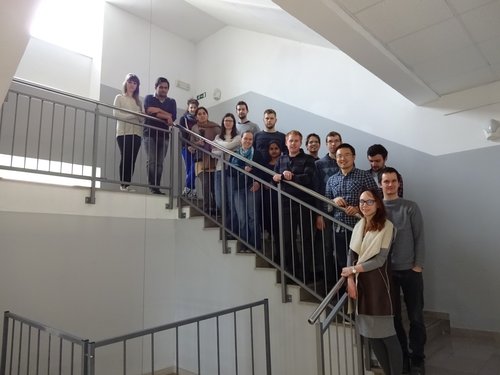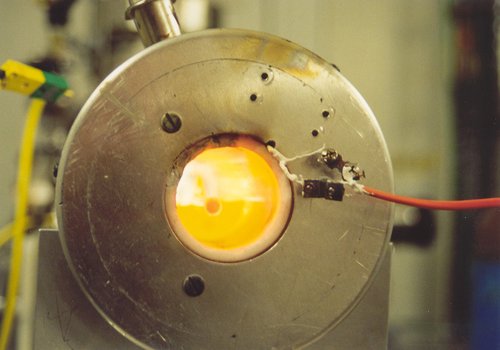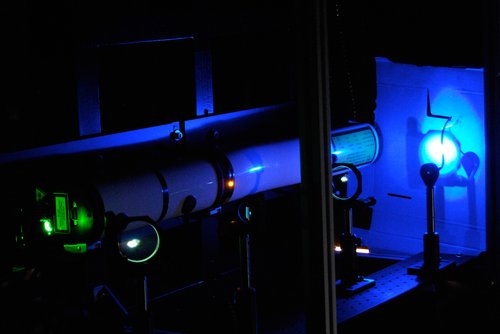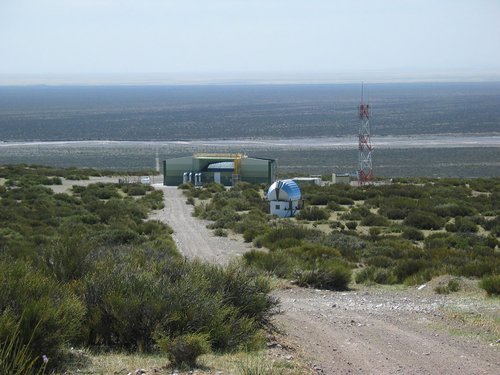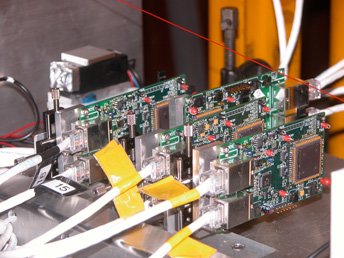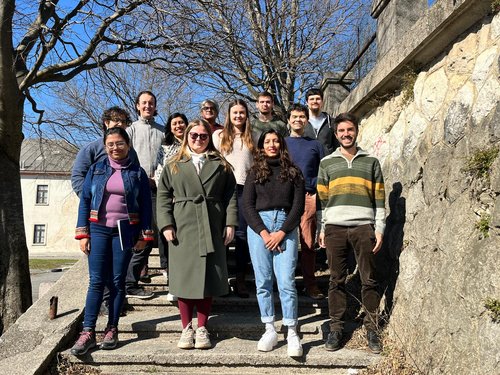Physics (Third Level)
| Study programme: | Doctoral study programme Physics |
|---|---|
| Main fields of study: | Natural and mathematical sciences |
| Programme code: | 3FI |
| Programme cycle: | Third cycle doctoral degree |
| Name of the qualification: | Doctor`s degree |
| Qualification title: | Doctor of Philosophy |
| Qualification abbreviation: | Ph.D. |
| Final examination: | no |
| Dean: | prof. dr. Martina Bergant Marušič |
| Programme director: | prof. dr. Gabrijela Zaharijas |
| ECTS coordinator: | prof. dr. Iztok Arčon |
Programme description
Physics 3rd level programme is doctoral study programme.
The Senate of the University of Nova Gorica at its 75th session held on 18 January 2017 approved the extension of the III. level study program Physics from the current three years (180 ECTS) to four years (240 ECTS).
The four-year doctoral programme has started in the academic year 2017/2018.
Students who are currently enrolled in the three-year study programme will complete studies at the three-year programme.
Academic programme Physics accredited as the Bologna III. level programme and is the final stage of the studies in the field of physics at the University of Nova Gorica. It is intensely focused at student research activities. These activities as conducted in research groups from various laboratories within the University as well as in companies and other research institutions. This academic programme is suited for students who wish to deepen their knowledge in the fields of properties of modern materials, material characterisation methods, which facilitate information on electronic, structural and chemical properties of those materials at atomic and molecular levels, numerical methods for modelling of processes which govern phase transitions in materials, high energy physics and elementary particle astrophysics.
The main goal of the programme is to educate top scientists that are capable of independent research in various fields of physics. Their careers will be aimed at performing the most difficult tasks at research institutes and universities. The study programme is the basis for the preparation of individual study and research programmes for each individual student. Courses are therefore selected on the per student basis. Most courses will be given individually or in small groups. Horizontal connections are possible via the ECTS credit system, which enables course exchanges between the graduate programmes at the Faculty of graduate studies of the Universtiy of Nova Gorica as well as at other Bologna declaration accredited universities. Lecturers are experienced international experts in their respective fields of expertise.
Graduates of the doctoral study programme Physics can aspire to find employment in research institutes and universities worldwide, pursuing their scientific career in physics. They will be the candidates for taking leading jobs in industrial research departments and will be trained to deal with questions such as development of new technologies and products, and strategic company decisions.
Information for students
Formal procedures for the submission, examination and defence of the dissertation
Sample of the proposal PhD topic
ECTS credit system
The programme Physics is designed according to the principles of the Bologna declaration. The transparency of the system of studies is given by the ECTS credit system, which enables the transitions of students between various faculties and universities. This gives the students of the proposed programme the opportunity to visit foreign faculties, as they enable the students the participation in individual courses, semesters or years abroad.
Employment opportunities
Graduates of the doctoral study programme Physics can aspire to find employment in research institutes and universities worldwide, pursuing their scientific career in physics. They will be the candidates for taking leading jobs in industrial research departments and will be trained to deal with questions such as development of new technologies and products, and strategic company decisions.
Recognition of knowledge and skills attained before enrollment
Skills and knowledge of a candidate attained previously through formal education can be recognized. Recognition is based on formal documents certifying these, and the recommendation of the Scientific council of the programme. The extent and the content of the previous work are graded according to the ECTS system, with a maximum of 15 ECTS. Recognized skills/knowledge can replace courses covering comparable topics.
Knowledge obtained via life-long learning can at the study programme Physics be fully recognized without limitations to the total ECTS credits, as long as the courses are consistent with the programme at the second level and/or in accord with certain additional study obligations.
Transitions between programmes
Transitions to the study programme Physics from other programmes are possible only if those programmes are covering the field of physics. The transitions have to be in accord with the currently valid legislation of the Republic of Slovenia (Law of higher education, Requirements for transitions between study programmes and other regulations).
Admission requirements
To qualify for entry into the graduate program Physics, applicants must satisfy the following admission requirements:
- have completed a 2nd cycle master’s study preogramme;
- have completed at least a four-year academic undergraduate programme accredited with 240 ECTS credits;
- have completed a uniform five year master’s study programme accredited with 300 ECTS credits;
- have completed a specialization after previously finished professional study programme, and had passed additional study obligations within 30 to 60 ECTS credit points;
- have completed an equivalent program abroad;
If the number of applicants exceeds the number of available positions, successful candidates will be selected on the basis of their previous academic achievements.
Courses given per year
1st year| Seminar | 6 ECTS |
| Chosen topics | 24 ECTS |
| Research work I | 30 ECTS |
| TOTAL | 60 ECTS |
| Research work II | 30 ECTS |
| Chosen topics | 30 ECTS |
| TOTAL | 60 ECTS |
(For 3 year study programme.)
| Research work III | 30 ECTS |
| Dissertation | 30 ECTS |
| TOTAL | 60 ECTS |
(For 4 year study programme.)
| Research work III | 60 ECTS |
| TOTAL | 60 ECTS |
(For 4 year study programme.)
| Research work IV | 30 ECTS |
| Dissertation | 30 ECTS |
| TOTAL | 60 ECTS |
Programme progression requirements
In order to proceed to the second year of study, candidates must obtain at least 60 credit points.
In the second year the student submits the application for approval of dissertation topic.
To enrol into the third year of the Physics doctoral study programme, candidates must fulfil all first-year requirements as well as obtain 60 credit points from the second year of study.
The condition for enrolling in the third year is completion of 120 ECTS credit points.
In the third year, the student focuses exclusively on research work III (60 ECTS credit points).
The condition for enrolling in the fourth year is completion of requirements of all three years (180 ECTS credit points).
In the fourth year, the student focuses exclusively on research work IV (30 ECTS credit points), which results in a successful defence of the doctoral dissertation (30 ECTS credit points).
Condition for completing the study program
Students must successfully pass all exams and all obligations in relation to all subjects fulfilled according to the curriculum, and successfully defence of the doctoral dissertation, for which the student collects 240 ECTS.
Educational and professional goals
The main goal of the study programme Physics is to educate top scientists that are capable of experimental work in various fields of physics. Their career will be connected to the most difficult tasks in research institutes and universities.
The study is based on the work in a research group with an emphasis on a certain research field, which enables an advance of knowledge in the field. Each student is assigned a supervisor that monitors his or her progress in both the research work as well as regarding the examination requirements. The main goal of the courses is to give the students both the theoretical as well as practical knowledge needed in their research.
Courses refresh
1. year
2. year
| Compulsory courses | Hours | ECTS |
|---|---|---|
| Research work II | 900 | 30 |
| General elective courses | Hours | ECTS |
| *Contemporary cosmology | 360 | 12 |
| *Group theory | 180 | 6 |
| *Laboratory of Scanning Electron Microscopy | 180 | 6 |
| Astroparticle physics | 360 | 12 |
| Atmospheric Physics | 270 | 9 |
| Communication in science | 180 | 6 |
| Contemporary particle physics | 180 | 6 |
| Crystallography | 180 | 6 |
| High-Resolution Nuclear Magnetic Resonance | 180 | 6 |
| Introduction to discretisation methods | 180 | 6 |
| Modern astrophysics | 360 | 12 |
| Modern experimental methods in astroparticle physics | 360 | 12 |
| Selected Topics from Molecular Spectroscopy | 180 | 6 |
| Selected topics in Statistical Physics | 180 | 6 |
| Selected topics in biophysics | 180 | 6 |
| Selected topics in nanoscience | 270 | 9 |
| Solid-state nuclear magnetic resonance | 180 | 6 |
| Structural analysis of materials with x-ray absorption and emission spectroscopy and microscopy | 270 | 9 |
| Surface Science | 180 | 6 |
| Surface modifications with radicals | 180 | 6 |
3. year
| Compulsory courses | Hours | ECTS |
|---|---|---|
| Research work III | 1800 | 60 |
4. year
| Compulsory courses | Hours | ECTS |
|---|---|---|
| Dissertation. | 900 | 30 |
| Research work IV. | 900 | 30 |

